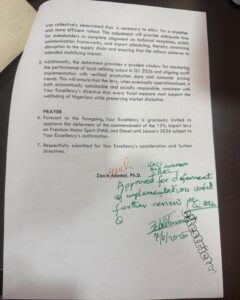
By Anthony Iwuoma
Kindly share:
President Bola Ahmed Tinubu’s decision to remove the 15% import duty on petrol marks a significant shift in Nigeria’s energy and trade policy.
The decision followed a leaked November 7, 2025 memo, titled: “Deferment of the commencement of implementation of thePremium Motor Spirit (PMS) and diesel import duty,” signed by Zach Adedeji, PhD. It acknowledged the good intentions of the policy but added that “following a thorough assessment of the market conditions and the agreed strategy implementation roadmap, it was collectively determined that it is necessary to allow for a smoother and more efficient roll out.” It, therefore, prayed for a postponement to January 2026.
Coming at a time when the country is navigating the delicate balance between domestic refining ambitions and immediate economic pressures, the move carries wide-ranging implications for inflation, revenue, industrial competitiveness, and public confidence in government policy.
Removing the 15% import duty directly reduces the landing cost of petrol. Importers no longer need to factor in the additional levy when pricing fuel, which means that pump prices are likely to remain stable or even decline slightly. This brings immediate relief to households and businesses already grappling with high living costs and transportation expenses.
By averting another upward adjustment in fuel prices, the decision helps to slow inflationary momentum, particularly in food, transport, and services, where fuel costs play a central role in determining prices across the economy.
In the months preceding the policy reversal, concerns grew among marketers that the import duty could make petrol imports less profitable. This risked creating artificial scarcity as importers pulled back or delayed shipments. By suspending the duty, the government has effectively removed a bottleneck that could have disrupted fuel distribution nationwide.
A more predictable import environment encourages marketers to maintain supply lines, reducing the likelihood of queues or panic buying that often accompany uncertainty in the downstream sector.
The removal of the import duty, while beneficial to consumers, reduces potential revenue for the Federal Government. The levy could have generated billions of naira in additional income at a time when fiscal space is already tight. With debt servicing costs rising and public spending needs expanding, the suspension of the duty creates a gap that will have to be filled through other measures, such as improved tax compliance, subsidy savings, or borrowing.
This underscores the enduring tension between short-term political sensitivity to fuel prices and the long-term goal of fiscal sustainability.
One of the underlying motives behind the original duty was to protect Nigeria’s emerging domestic refining capacity. As refineries, such as Dangote’s massive facility, began to operate, policymakers hoped to make imported fuel less competitive and thus encourage local production.
By removing the duty, the government postpones that protective shield. Imported fuel remains relatively cheaper, and local refiners may face tighter profit margins in the short term. On the other hand, the move buys time for domestic producers to reach full capacity, stabilise output, and resolve early operational challenges before competing head-on in the open market.
Petrol imports are a major source of foreign exchange demand. The removal of the import duty could, in the short run, sustain high levels of importation, keeping pressure on Nigeria’s foreign reserves and exchange rate. However, if the policy helps ensure adequate fuel supply and prevents market disruptions, it could indirectly stabilise the naira by reducing speculative demand for foreign exchange that often accompanies fuel scarcity.
The longer-term effect will depend on how quickly local refining expands to displace imports and reduce dollar outflows.
Maintaining an open import regime prevents any single player from dominating the market, which is vital for price competition and consumer welfare. The removal of the duty ensures that independent marketers can still import fuel competitively, rather than ceding the market entirely to domestic refiners or government-favoured operators.
In the long run, however, regulatory oversight will be needed to strike a balance, ensuring that both importers and refiners operate under transparent, competitive conditions that prevent monopolistic practices.
From a governance perspective, the reversal of the import duty signals responsiveness to economic realities and public sentiment. It demonstrates a willingness to adjust policy when faced with potential negative consequences for citizens. Yet, it also highlights the importance of coherent policymaking and stakeholder consultation. Frequent policy reversals can create uncertainty for investors, especially in a sector as capital-intensive as energy.
For lasting credibility, the government will need to articulate a clear roadmap for fuel pricing, import policy, and domestic refining integration, one that balances stability with reform.
At a social level, the decision helps maintain a fragile sense of economic calm. Nigerians have endured months of high prices, following the removal of fuel subsidies, and another hike could have triggered unrest or eroded public confidence. The suspension thus serves as a stabilising gesture that aligns with the government’s broader goal of cushioning citizens during the transition to a market-based energy system.
Economically, it provides breathing space for businesses dependent on fuel, potentially averting job losses and cost pass-throughs that would deepen hardship.
The removal of the 15% import duty on petrol is a pragmatic response to the realities of Nigeria’s energy market. It prioritises short-term economic stability over immediate revenue generation and industry protection.
However, this relief is temporary. For the policy to yield sustainable benefits, it must be complemented by clear strategies to boost local refining capacity, strengthen competition, diversify fiscal revenue, and ensure policy consistency.
In essence, the decision underscores the government’s challenge: balancing the urgent need to protect citizens from price shocks with the long-term imperative of building a self-sufficient, resilient petroleum sector.







